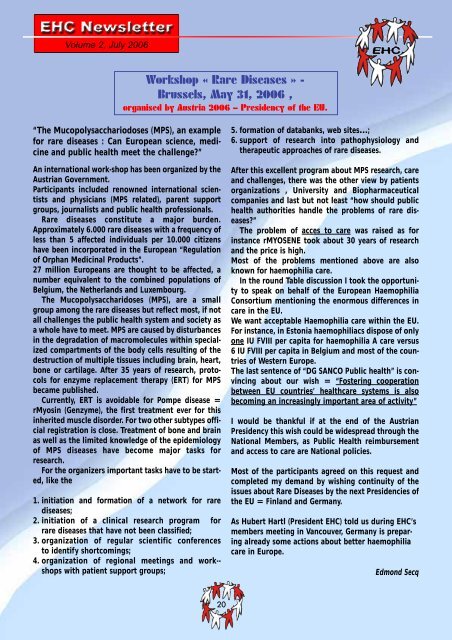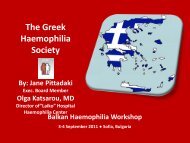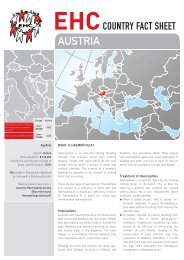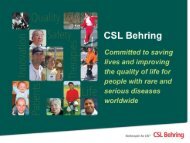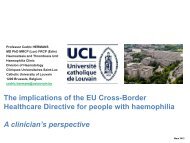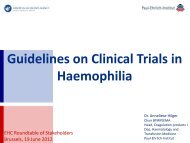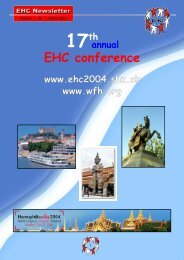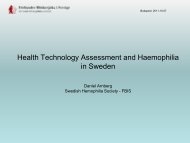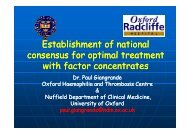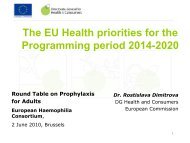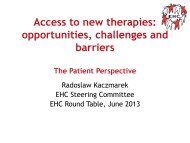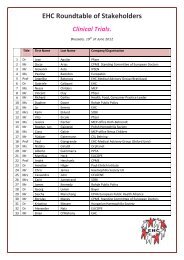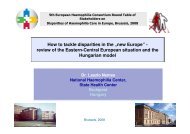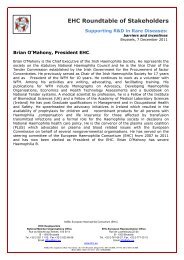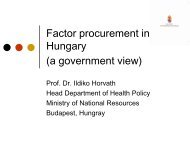Volume 2, July 2006 - EHC
Volume 2, July 2006 - EHC
Volume 2, July 2006 - EHC
- No tags were found...
You also want an ePaper? Increase the reach of your titles
YUMPU automatically turns print PDFs into web optimized ePapers that Google loves.
<strong>Volume</strong> 2, <strong>July</strong> <strong>2006</strong>Workshop « Rare Diseases » -Brussels, May 31, <strong>2006</strong> ,organised by Austria <strong>2006</strong> – Presidency of the EU.“The Mucopolysacchariodoses (MPS), an examplefor rare diseases : Can European science, medicineand public health meet the challenge?”An international work-shop has been organized by theAustrian Government.Participants included renowned international scientistsand physicians (MPS related), parent supportgroups, journalists and public health professionals.Rare diseases constitute a major burden.Approximately 6.000 rare diseases with a frequency ofless than 5 affected individuals per 10.000 citizenshave been incorporated in the European “Regulationof Orphan Medicinal Products”.27 million Europeans are thought to be affected, anumber equivalent to the combined populations ofBelgium, the Netherlands and Luxembourg.The Mucopolysaccharidoses (MPS), are a smallgroup among the rare diseases but reflect most, if notall challenges the public health system and society asa whole have to meet. MPS are caused by disturbancesin the degradation of macromolecules within specializedcompartments of the body cells resulting of thedestruction of multiple tissues including brain, heart,bone or cartilage. After 35 years of research, protocolsfor enzyme replacement therapy (ERT) for MPSbecame published.Currently, ERT is avoidable for Pompe disease =rMyosin (Genzyme), the first treatment ever for thisinherited muscle disorder. For two other subtypes officialregistration is close. Treatment of bone and brainas well as the limited knowledge of the epidemiologyof MPS diseases have become major tasks forresearch.For the organizers important tasks have to be started,like the1. initiation and formation of a network for rarediseases;2. initiation of a clinical research program forrare diseases that have not been classified;3. organization of regular scientific conferencesto identify shortcomings;4. organization of regional meetings and work--shops with patient support groups;5. formation of databanks, web sites…;6. support of research into pathophysiology andtherapeutic approaches of rare diseases.After this excellent program about MPS research, careand challenges, there was the other view by patientsorganizations , University and Biopharmaceuticalcompanies and last but not least “how should publichealth authorities handle the problems of rare diseases?”The problem of acces to care was raised as forinstance rMYOSENE took about 30 years of researchand the price is high.Most of the problems mentioned above are alsoknown for haemophilia care.In the round Table discussion I took the opportunityto speak on behalf of the European HaemophiliaConsortium mentioning the enormous differences incare in the EU.We want acceptable Haemophilia care within the EU.For instance, in Estonia haemophiliacs dispose of onlyone IU FVIII per capita for haemophilia A care versus6 IU FVIII per capita in Belgium and most of the countriesof Western Europe.The last sentence of “DG SANCO Public health” is convincingabout our wish = “Fostering cooperationbetween EU countries’ healthcare systems is alsobecoming an increasingly important area of activity”I would be thankful if at the end of the AustrianPresidency this wish could be widespread through theNational Members, as Public Health reimbursementand access to care are National policies.Most of the participants agreed on this request andcompleted my demand by wishing continuity of theissues about Rare Diseases by the next Presidencies ofthe EU = Finland and Germany.As Hubert Hartl (President <strong>EHC</strong>) told us during <strong>EHC</strong>’smembers meeting in Vancouver, Germany is preparingalready some actions about better haemophiliacare in Europe.Edmond Secq20


